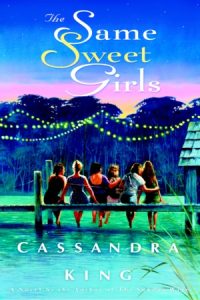Book Group Guide
The questions that follow are intended to enhance your group’s reading and discussion of THE SAME SWEET GIRLS by Cassandra King.
Questions
1. Look at the Walt Whitman quote at the beginning of The Same Sweet Girls. Why does King use this here?
2. Why does Corrine state early on that, “The illusion of sweetness, that’s all that counts. We don’t have to be sincerely sweet, but by God we have to be good at faking it. Southern girls will stab you in the back, same as anyone else, but we’ll give you a sugary smile while doing it”? Why is this important to the story? How do Southern women differ from women in other parts of the country?
3. Looking at each chapter, how is the book structured? Why does King utilize this style here? What is the affect of multiple narrators?
4. Briefly describe each of the Same Sweet Girls. Share your impression of the group. Who do you like the most, and why? What are their backgrounds? How did they become a group, and why are they such good friends?
5. Consider Miles, Jesse Phoenix, Joe Ed, Paul and Cal. What are your impressions of these men? What are their roles in the story?
6. Thinking about the couplings of Julia and Joe Ed, Corrine and Miles, and Lanier and Paul, how did these couples get together? What kind of relationships do these Same Sweet Girls have with the men in their lives? What do these relationships reveal, or possibly reflect, about the Same Sweet Girls views of themselves?
7. Focusing on Astor’s and Roseanelle’s role in the book. Why are these unlikely characters accepted and tolerated, even loved, by the rest of the group? How do they influence other characters in the book? Why do others accept and even ignore such obvious flaws in their friends?
8. Lanier keeps a sort of diary, what she calls her Life Lessons notebook. Think about some of Lanier’s notebook entries. For example, “Any landing you walk away from is a good landing;” “When the pupil is ready, the teacher appears;” “Seems to me that all males are obsessed with expanding their bodies and females with shrinking theirs, which must have something to do with their self-images.” Discuss what they mean and whether or not they are helpful to you.
9. In Chapter 12, what do you make of Julia’s saying she “survived life by slow paddling down the river of denial”? What has she been denying? Recount her relationship with her mother. What was her mother’s reaction when Bethany was born? Did Julia somehow agree with her mother? How does Julia evolve, and what enables her to do so?
10. Looking at Corrine, what do the gourds represent, both literally and figuratively? Why does King choose gourds instead of canvas or pottery for Corrine’s art? Trace Corrine’s personal history. Why is she the one who has a terminal disease? What does Miles mean when he says to her, “Your biography becomes your biology?” Is this true in her case? Do you believe this is true in general? Why?
11. What gives Corrine the motivation to stand up to Miles? Share how you reacted when she finally does.
12. In Chapter 18, Lindy confronts Lanier about Lanier’s affect on her and others: “Then change, Mama . . .” How did you react do this speech? What would you say to Lindy? What would you say to Lanier?
13. In Chapter 23, there is a discussion of helping a friend die. What would you do if a friend or family member asked you to assist their death? Would you want that kind of help? Knowing what Corrine does about her disease, what you advise her to do about her treatment? Why is Lanier so surprised when she learns Paul might assist someone’s death?
14. Why is Cal so attracted to Corrine? What is significant about the timing of his interest? What is the significance of the large kettle gourd that he returns to her? What enables his aged grandmother to understand the purpose of this kettle gourd? Discuss the paragraph in Chapter 26 where Cal says to Corrine, “Damn right you’re not like me . . . You’ve got to finish that one.”
15. What resonates, and affects you the most, about The Same Sweet Girls? What stays with you?
About the Author
Cassandra King is a native of Alabama, where she formerly taught English and creative writing classes. She has published stories and essays in various quarterlies and anthologies, and her second novel, The Sunday Wife, was published to fine reviews and acclaim. It was a SEBA bestseller. She currently resides in South Carolina with her husband, Pat Conroy. She belongs to a real-life Same Sweet Girls group, which reunites every year.

